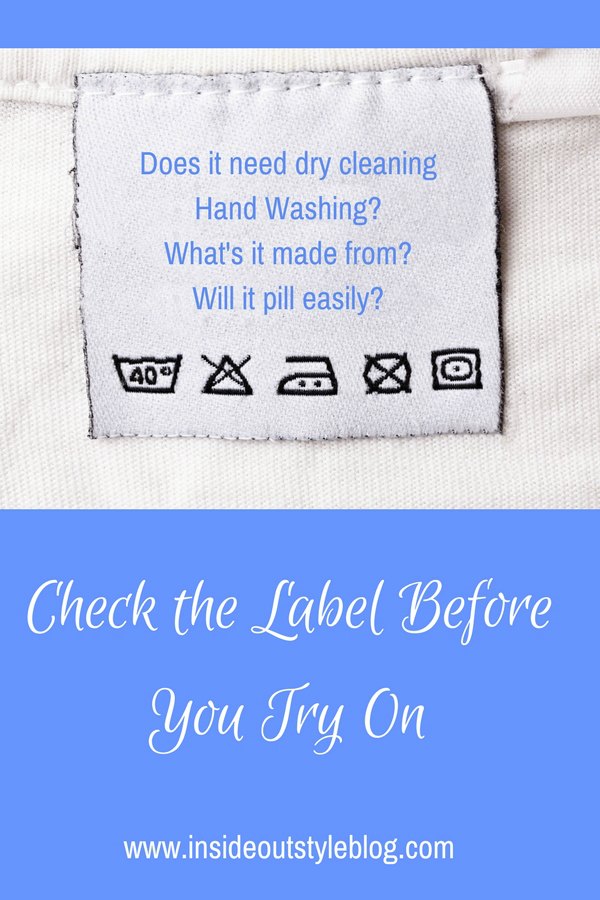Before I purchase anything (in fact before I even bother to try it on, as I don’t get naked if it’s not got some chance of working), I always, always, always check the label on the clothes for:
- Fibre content
- Care instructions
Why is this?
Well I know that some fabrics pill easily (you know get those nasty little balls that make the garment look worn out), which means there won’t be a long lifespan for the garment, and I want to buy what lasts for my wardrobe.
Now I don’t sweat a lot, but I know some people are, and synthetic fibres like polyester tend to hold in the sweat and start to smell (which is not pleasant either). So if you do sweat more, look for fibres that have higher percentages of natural fibres.
But, 100% natural fibres tend to have less stretch (or none if not a knit) and they may crease more. This is why you will see blends, as they do make the garment easier to care for and need less ironing.
What pills easily?
- Polyester
- Acrylic (I just won’t even buy this as it pills after one wear!)
- Nylon
- Wool (lower quality wools with shorter fibres – these ones usually feel itchy to the touch)
- Cotton (lower quality with shorter fibres, these won’t feel as soft to the touch)
Knits are more likely to pill than wovens, as a knitted fabric is less dense and so there is more movement in the fibres from arms and seat belts rubbing on the fabric. When you wear them, wash and dry there is a lot of rubbing of the fabric, which makes the ends of the fibres ball up and turn into these pills. This is why air drying (not tumble drying) your knits will prevent them from pilling as quickly.
Fabrics that are less likely to pill include tightly woven fabrics and fabrics made from tightly twisted yarns (this is why higher quality wool and cotton don’t pill).
Now how you look after the garment will also make them pill more easily too.
Check the Care Label
- Can it be machine washed?
- How about tumble dry?
I hate dry cleaning and hand washing, so I want to make sure that I don’t resent my clothes.
Why would I resent them?
Well if they require hand washing, that’s just “work” in my eyes (and I’ve got enough work without having more in the laundry than absolutely necessary).
And dry cleaning = cost. That garment becomes more and more expensive as each time I wear it, if I drop my lunch on it, then it needs cleaning and there is a dollar cost to dry cleaning (as well as a time for me to go to the dry cleaners).
This is why I shun dry cleaning for all clothes except very special occasion wear and jackets.
If you can do a gentle machine wash instead of a hand wash – I’m totally fine with that!
And then I do the Crush Test
What’s that? Grab a handful of the fabric and screw crush it in your fist. See if it springs back (leaves few or no lines) or it crumples (cos then when you sit down in the car or on the train, or in front of your desk for a short while, when you stand up you will be all crumpled looking.
I hate ironing at the best of times, so I don’t want my outfit to look all crumpled up moments after I have ironed it!
Tell me, which fabrics do find pill the least?
Which fabrics don’t need much in the way of ironing?
What do you always avoid?

















I was shopping the end of season sales yesterday and found myself doing exactly what you said. I checked the labels before trying on and ended up rejecting a sweater (cotton/acrylic), a blouse (polyester), and a t-shirt (nylon blend). I ended up with two tops which are natural fibers which feel soft to the touch. My choices are becoming seriously limited as I am also petite and very little in my size is offered in stores. I enjoy shopping, but it can be challenging to find the right size, style and quality in clothing. When I find the right combination, I intend to keep it and love it in my wardrobe for a very long time.
Yes, it limits, but then you’re happier with what you have, rather than being unhappy about what is in your wardrobe!
Imogen I was just laughing the other day at several labels I came across from my own closet.
One read that the dress could not be washed, could not be hand washed, could not be dry cleaned or spot cleaned. I just wondered if my choice was just to burn it. I actually washed it in the washing machine and it came out perfectly.
Sometimes they want you to dryclean as it reduces the chance that you will return it from poor washing, even though it can be washed!
Thanks so much for this post on fabrics. I never knew which fabrics were more subject to pilling, only that they do. I will not buy cheap clothing. When I see low priced (not on sale) articles of clothing, I move on!
Thanks again for your very informative article(as always).
Thanks Lucretia, hopefully this will help you in future as pilling is so annoying and cheapens the look of clothes so quickly.
Dear Imogen,
Great post, as always 🙂
I do the same, Inlook at the label first and if that’s ok, then I check it the price etc.. When I find the right garment, I try to buy it in several colours bc it’s so dificult to find good items.
I discovered viscose in recent years and it’s ideal for summer, my dresses don’t need ironing, look nice, also after several seasons of wearing and my sweet does not get as smelly as when I was wearing synthetic fibers. It does dry longer but for me that was a good reason to get couple more dresses to rotate 😉
All the best,
Urska
Yes I like viscose too – it’s a wood fibre and so has nice weight and drape!
One more thing – today I had a photoshoot for my website and I had to wear several outfits and it turned outvery well even without a stylist.
I wanted to let you know how reading your blog and your books for the past five years transformed my style and how dressing stylish and feminine now is so easy to me. Even remembering to accesorizre and how to make right combinations.. Thank you for all the knowledge and information you share with us.
Urska
Thanks so much Urska – I’m so glad that what you’ve gleaned here has transformed your style!
I’m not sure what is more likely to pill. My bust is proportionally larger than the rest of my body so I usually have to stick with fabrics with some stretch or shapeless to both fit my shoulders and still accommodate my bust. I stay away from fabric that feel uncomfortable on my skin. Found a shirt I loved but the fabric was itchy so I didn’t get it.
Good quality knits won’t pill fast (almost everything pills in the long term) this is why I keep a lambswool thing over my seat belt https://insideoutstyleblog.com/2012/12/stop-clothes-pilling.html
I wholeheartedly agree and usually do what you describe. A while ago, I owned a beautiful cashmere sweater. Because it was hand wash only, I ended up wearing it 3 times over 3 years. It was literally sitting in the dirty laundry hamper for a year at the time. In the end I threw it in the washer which ruined it for good.
Such a pity it was handwash – I have cashmere that happily gentle machine washes!
A polyester/rayon blended knit will pill because the rayon fibers tend to break and the polyester ones do not and they hold the weaker fibers as pills. Cotton blends will do this to some extent also. Rayon/nylon blends tend to do this a little less. And cotton/rayon blends don’t usually pill.